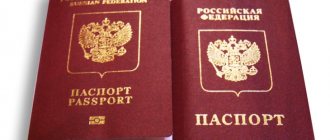Transliteration table for first and last names for a foreign passport:
a – a b – b c – v d – g d – d e – e f – e g – zh h – z i – i th – i j – k l – l m – m n – n o – o p – p r – r s – s t – t y – u f – f x – kh c – ts h – ch sh – sh sch – shch ъ – ie ы – y e – e yu – iu i – ia
Transliteration in a passport for traveling abroad
Errors in the spelling of last name/first name in a foreign passport are excluded under three conditions:
– the owner of the document, correctly and clearly printing the letters, enters the option into the form for the FMS;
– FMS service specialists enter data into the computer in full accordance with the sample and without contradicting the rules;
– a special program converts text from Russian alphabet to Latin alphabet.
When preparing data for entering your last name and first name in Latin letters into your international passport, you can use the online system to see what happens when the alphabet is converted by machine. But you need to look not only for an automated special program, of which there are many. You need to use a direct link to go to the GOST text and double-check the transliteration performed by the machine.
What if there is a discrepancy?
If one surname is written differently in different documents, there are two reasons: either a mistake was made, or the transliteration rules of different standards clashed. In the first case, replacement is required. The second refers to a situation where variable spelling is allowed due to divergences between old and new rules. Or the issue of adjusting the Latin version of the surname will be decided, taking into account the need for uniform recording in all documents.
The presence of an error is a reason to replace the passport, which with it is declared invalid. Moreover, if the application form was filled out correctly and a mistake was made by a FMS employee, the FMS service is obliged to issue a new paper passport 2 hours after submitting the photo (state duty is not charged). New passports take longer to process.
What to do if you need to match the last name in all documents, but the version in the passport issued according to the new rules will be different
If the entry option according to the 2014 rules does not coincide with the transliteration in other documents, the passport may be issued with a deviation from the new rules.
To do this, an application must be drawn up with a request for transliteration corresponding to the Latin version of the surname in other documents:
– the “header” is addressed to the head of the FMS department;
– indicate the required version of the last name and/or first name in Latin;
– motivation/justification is given why this is necessary (a single option is required for using financial, title and other documents);
– all documents are listed;
– a reference is made to clause 28.1.8 of FMS Order No. 211 dated March 26, 2014, in accordance with which the application is drawn up;
– photocopies of documents with the required transliteration are attached (birth and/or marriage certificates, residence permit, visa, old passport for travel abroad). A credit card will not be a compelling argument for deviating from the norm.
Deviation from the rules of transliteration of a proper name is not carried out simply at the request of the bearer of the surname without providing documents.
Source of the article: https://www.transliteratciia.ru/transliteraciya-imeni-i-familii-dlya-zagranpasporta/
Transliteration of the names Evgeniy and Evgeniya into English
The above-mentioned method of letter-by-letter translation of Russian Cyrillic words into Western Latin is called transliteration. We have already noted that the transliteration process is carried out using different methods, and now we offer to find out how these methods allow you to write the related names Eugene and Eugene in English.
International standards
Let's start with an analysis of the methods recognized as popular in English-speaking countries. As a rule, in Britain or the USA the sound “th” is written using the English “y”. And since the sound “y” in English is drawn-out, its sound is exactly similar to the Russian ending –й. Accordingly, when transliterating the name Evgeniy, the following spelling will result:
- Evgeny
Perhaps the example given is the most popular transliteration format, because even the Google search engine produces over 20 million results for this query.
Other English topics: Tongue twister She sells seashells on the seashore - practicing pronunciation
But do not forget that you can write the name Evgeniy in English in other ways. For example, if we leave the Russian “and” at the end, then we get the word “Evgeniy”. By the way, Google returns almost 13 million pages with this spelling. There is also an option to transliterate the name Evgeniy through the letter “j” - Evgenij. But for English-speaking countries, this format is not very typical, since “j” is read as “jay”, not “y”. But in other Western regions, a similar writing style is applicable: Google returns 2.5 million pages for this name.
Accordingly, Evgenia is written in English letters in a similar way, only the letter “a” appears at the end. Here are the transliteration options for a female name:
- Evgenia;
- Evgeniya;
- Evgenija.
This information concerns international preferences in the spelling of Russian names. But we have also developed our own “translation” standards. Let's take a closer look at them.
Russian transliteration method
Let's start with a basic question: in what case is the name Evgeniy written in English in Russia? Of course, first of all in the case of applying for a foreign passport. It is with this moment that the emergence in our country of a unified system of transliteration of names into the Latin alphabet is connected. Previously, passport offices used different translation programs, which led to numerous confusions and discrepancies. But for almost 10 years now, a single standard has been in force in our country, and since then it has been successfully adopted from the Federal Migration Service by various airlines, post offices and other institutions with international connections.
According to our Russian standard, the sound “th” is conveyed by the usual English letter “i”. In this case, the Russian Evgeniy turns into an Englishman with the name “Evgenii”. And the female name Evgenia in English is written according to this standard as “Evgeniia”. Note that in both cases, the penultimate letter “and” at the end is also preserved! This is how endings that are close to the Russian sound are obtained – ii (-й) and –iia (-я). It turns out that Russian standards for how the name Evgeniy or Evgenia is written in English are the most correct in terms of pronunciation matches.
So we looked at several ways to transliterate the names Eugene and Eugene. For personal correspondence, you can choose any option you like from those presented in the article. But for maintaining business documentation, we recommend following the rules of the Russian standard. Moreover, when preparing documents, it is better to adhere to uniformity in the spelling of the name. Otherwise, controversial situations may arise, to the point where you will have to prove with the help of a lawyer that the person with documents in the names Evgeny and Evgenii is the same citizen.
Other English topics: Name Vyacheslav in English - how to write, transliteration options
Agree, it is better to avoid such difficulties, especially since translating documentation into English in a uniform style is not so difficult. And speaking of translation. After all, we have not considered another important nuance! We will eliminate this omission using the next section.
What is transliteration?
Writing the last name and first name in the Latin alphabet is called transliteration. What exactly is indicated in the document depends on the information that the applicant writes in the application for issuance. Additionally, migration service employees do not carry out transliteration; they are required to write down the information as indicated by the applicant and not make mistakes.
To transliterate his first and last name for a foreign passport, each applicant can use the automatic transliteration program absolutely free of charge.
In essence, transliteration is tracing paper. In the case of surnames and given names, this is the writing of words in Latin letters.
Important! Don't confuse transcription and transliteration. Transcription is the writing of the sound of words using special phonemes that convey how the word should sound.
What changes have occurred?
In 2021, adjustments have been made to the rules. New standards that have already come into force are similar to international ones adopted in other countries. They will eliminate misunderstandings for domestic tourists when traveling abroad.
The changes affected most popular Russian names and many common surnames. We list the replacements that are important to know:
- The letter “E” now also looks like “E” in transliteration. Previously it was written as "YE".
- “Y” received a new designation; now it looks like “I”. Previously it was indicated as "Y".
- The vowel “Yu”, when written, is transformed into “I” with the addition of “U”. Now this letter looks like “IU”, previously it was “YU”.
- Corrections have also been made to the spelling of “C”. Previously, it looked like “TS” in the passport, now it looks like “TS”.
- Another one of the typical Russian “Ъ” simply disappeared when translated into Cyrillic, but is now present and looks like “IE”.
It is worth considering specific examples in the old and new spelling. More specifically:
- The name Egor in the new format looks like Egor instead of the difficult to spell Yegor.
- Name Julia – Iulia
- Dmitry will be called Dmitrii in the new documents.
- The name Valery should be written like this – Valerii.
- An example of a surname is Tsaplin, previously the spelling looked like Tcaplin, now Tsaplin.
Checking using a special service
For translation, you can use visual tables in which Russian letters and new symbols are entered in accordance with the current rules. But if you don’t have time to do this or your first and last name are too long, then you can use a special service. All that is required in this case is to enter your data in the translation form and immediately receive the result in the second field.
The transliteration program operates according to the norms of the new law. It is available for use free of charge, both for residents of Russia, Ukraine and other countries.
What rules should you remember?
Current transliteration rules for your international passport:
- replacement of letters in the surname and first name is carried out sequentially according to the new transliterations;
- when using online services, it is still worth reviewing the result again;
- For a foreign passport you only need your first and last name;
- After entering the data into the application for a foreign passport, you should once again check the result of the service and self-transliteration.
Is it possible to keep my old name?
If the time has come to change your international passport, and you do not want to change the spelling of your first and last name according to the new requirements, then it is possible to leave the old version. In this case, you will need to spend a little more time and write a corresponding application. Such a right is given by Order No. 211 issued by the FMS in 2014, or more precisely, its paragraph 28.
The application must be written in free form, but there is an important point here - indicating the reason why the citizen wants to leave the previous spelling. Such a basis may be a document issued in the name and surname of a citizen in the old spelling. The following are considered significant:
- open visa;
- residence permit from another state;
- marriage certificate concluded with a foreigner;
- documents on education at a foreign university.
In order for the responsible authority to have the right to retain the old spelling, a copy of one of the specified documents must be submitted along with the application.
How to write Tatyana correctly according to Russian GOST
We learned how we are used to writing the Russian name Tanya in America and Britain, and also looked at options for transliterating abbreviated and affectionate forms. Now it’s time to get acquainted with Russian writing standards.
Let's imagine a situation: why do you need the English version of your own name? Of course, first of all, to obtain a foreign passport, where the name is written in English. Previously, there was a little confusion around this point in Russia: the same names in passport offices were sometimes written in different ways. For example, they could write the name Tatyana in English letters Tat'yana, Tatyana or Tatiana. Sometimes such discrepancies caused people great trouble, because discrepancies in identity documents are very difficult to explain at customs control, when registering real estate, etc.
Therefore, since 2010 in Russia, a single state standard has been used for entries in a foreign passport in English, or more precisely in Latin letters. Specifically, transliteration into English is regulated by GOST with the name “R 52535.1”. So, it is interesting that according to this document, the soft vowels “Yu” and “I” are transmitted through the letter “I” (respectively, yu - iu, i - ia). In this case, it turns out that the preceding consonant is automatically softened due to the soft I, i.e. There is simply no need to use an apostrophe. Judge for yourself using the example of how to spell the correct sound of the name Tatyana in English:
- Tatiana Tatiana )
Try reading this word out loud. Due to the fact that after t the speech apparatus is preparing to pronounce i, the sound of t itself is already soft. By the way, it is not without reason that the name Tatyana was originally written in Latin in this way: the inscription almost perfectly conveys the sound embodiment of the name in writing.
Now you know how Tatyana is written and pronounced in English. Agree, the question turned out to be quite interesting and certainly not obvious. Let us add that there are many more similar riddles in English, such as the name Alexander in English or Katya.
Possible difficulties
It would seem not so difficult to rewrite personal data into English in the form of transliteration, but certain difficulties may still arise. At the same time, many are worried about what will happen if there are differences in spelling with other documents or errors are discovered. People have heard about problems if just one letter in documents does not match.
If an error is found
When receiving a passport, it is very important to check whether all the data in it is correct, first and foremost your first and last name. If an error is found in the spelling of letters in the Latin alphabet, then you should look for a statement that contains the original data. Depending on the detected result, the following actions are possible:
- The applicant made a mistake - it is his own fault and he changes his passport at his own expense. Collects documents, pays fees, waits for production.
- The employee made a mistake - the Main Directorate for Migration Affairs of the Ministry of Internal Affairs replies. In this case, officials are required to issue a new document within 2 hours. True, this only applies to paper passports. There is no need to provide new documents, nor do you need to repay the fee. All you need is a photo. If you are applying for a biometric passport, you will not be able to receive it earlier than in a week. All due to technical manufacturing features.
Important! You cannot use a passport with your fingerprints and even one letter written incorrectly. Such documents are considered invalid.
The most common mistakes:
- missing letter;
- extra letter;
- spelling error.
The name is written differently in the documents
If the foreign passport of a citizen of the Russian Federation and his visa have different spellings of his first and last names, then problems will not arise. This also applies to other documents with differences. This is only relevant if the differences are due to the application of new transliteration rules. Once the old passport expires, it will be replaced with a new one with the correct spelling. The same applies to documents and bank cards.
Transliteration
Transliteration is the transfer of signs of one language by symbols of another.
That is, in the case of transliteration into English, we write Russian names using the English alphabet. Transliteration, which can be briefly called transliteration, conveys not the sound of the word, but the spelling. Transcription, a word familiar to us from English lessons, helps us find out how the word sounds in real life. It is necessary to remember that in business correspondence and in official documents proper names - first name, patronymic, last name - are not translated, and English-language analogues are not selected for them. You need to write the word in Latin. But the difficulty lies in the fact that there are no identical rules, no clear transliteration norms. The spelling of the name Evgeniy can be seen as Evgenia , Yevgenia , Yevgeniya . However, it is still possible to determine the general requirements for transliteration.








